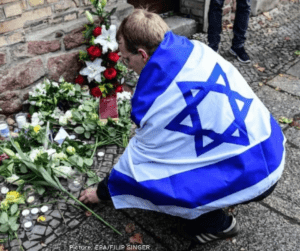HOPE not hate uses cookies to collect information and give you a more personalised experience on our site. You can find more information in our privacy policy. To agree to this, please click accept.
Yom Kippur. The most intensely holy day of the Jewish year. The day when we meticulously list all the ways we may have fallen short of the mark, and ask God, in spite of our shortcomings, to inscribe us in ‘the Book of Life’ – granting us another full year of life in which to achieve our individual purpose in the world.
And BAM! Concerned that my words might be misinterpreted, I already find myself inserting the word ‘individual’ before purpose. Without the word ‘individual’ might people fall for the age-old conspiracy theory, looking for undercurrents of Jewish supremacy, some proof that I’ve let slip that Jews really do have some kind of evil grip on world events?
Initial reports suggest that yesterday’s attacker in Halle, Germany, was driven by just such a conspiratorial antisemitic ideology. But let’s not kid ourselves that terrorism comes out of nowhere. It’s at the top of the pyramid of hate, the worst manifestation of a sickness that starts with words, throwaway thoughtless comments, ‘banter’.
When I returned from the synagogue last night, I broke my fast, turned my phone back on to check in with older relatives to make sure they were well, only to see the terrible news from Germany. My Twitter feed was full of messages expressing shock and outrage, and oddly to me at least, surprise. It wasn’t until I checked in with a non-Jewish colleague that my reaction to this started to make sense. He commented how eerie it was to see social media empty of Jewish voices after the attack. Eerie yes, but those Jewish accounts would most likely not have expressed the same sense of surprise. Shock, yes, grief, yes, and certainly a huge acknowledgement of gratitude for the impact of the synagogue security measures which limited the size of the attack, potentially averting a far worse massacre with a far higher death toll.

Sadly, for anyone connected to the Jewish community, attacks or attempted attacks on Jewish targets are too regular an occurrence to be greeted with surprise. Non-Jews I know are often shocked to hear that pretty much everyone I know in the Jewish community knows someone who has been affected directly by terrorism. Whether in Israel, or in Toulouse, Copenhagen, Brussels, Pittsburgh, Poway and now Halle, tragically too many of us have direct experience of the real consequences of terror.
Historically, Jewish communities have become accustomed to being vulnerable, and having to move on to avoid persecution or even death. The idea of having a passport to hand and a suitcase packed is often pooh-poohed in today’s age, but European Jewish identity in particular is built on the reality of centuries of persecution. As the old saying goes, there’s a reason Jews learn to play the violin and not the piano – it’s easier to pack it up and take it with you.
That’s why in 2019, someone like me, living an unquestionably comfortable middle-class life, is fearful. The rise in antisemitic sentiment, wherever it comes from politically, and however it manifests, whether in words and slurs or in bullets and bombs, and wherever the victims live, whether in my immediate community or across the world, gives me a fearful knot in my stomach. I don’t look like a victim, I certainly try not to live as a victim, but that is my reality in 2019.
The only question is how we all, collectively, respond. It’s time to unequivocally face the fact that anti-Jewish racism in this country, and across Europe, is rising. We all have a part to play in challenging it wherever we see it, and however we see it manifest itself. History has taught us that being a bystander is not an option.